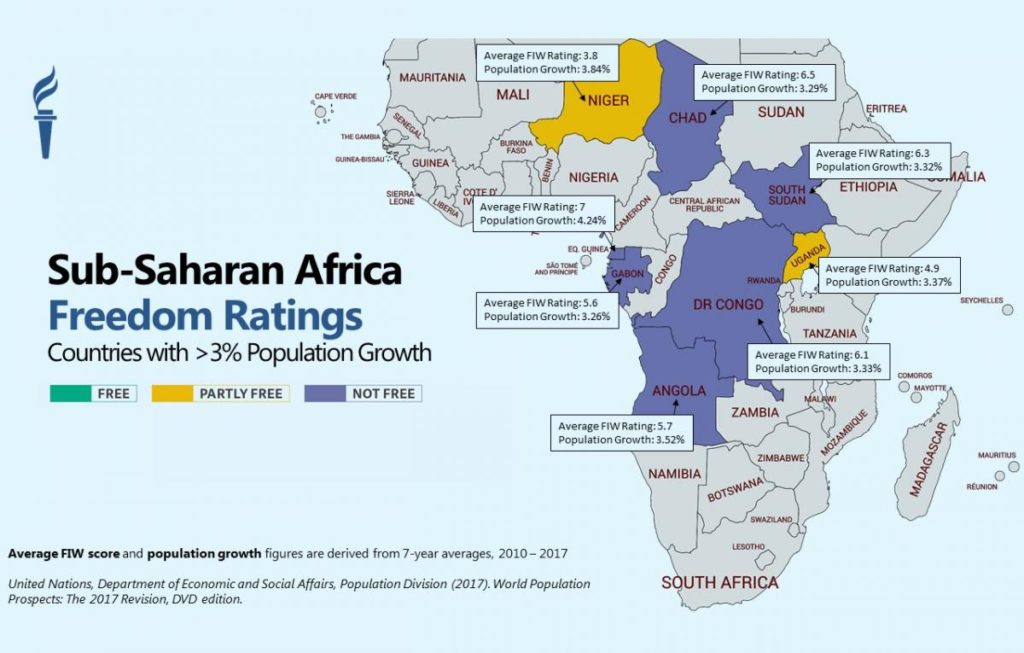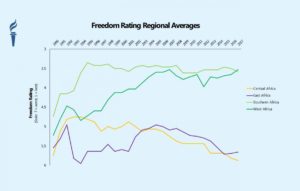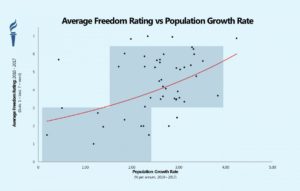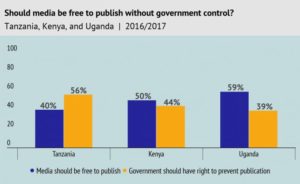
The last decade has seen the standing of democracy in Africa improve, argues Natasha Ezrow, a senior lecturer at the University of Essex. In the early 1980s, only five countries in Africa could be considered democratic: Botswana, Gambia, Mauritius, Senegal and Zimbabwe. More recent years has seen the fall or peaceful resignation of important authoritarian figures.
But the story in sub-Saharan Africa is more complicated, according to Freedom House analysts Jon Temin and Daniel Summers. Sorting through the report data (publicly available here), they identified three key trends that have broad implications for the continent’s democratic trajectory:
 Trend No. 1: Regions are diverging: The relative democratic parity in sub-Saharan Africa at the beginning of the 1990s—at the tail end of the so-called “third wave” of global democratization—has given way over the past two decades to a distinct regional divergence: Southern and West Africa have significantly improved their democratic governance, but Central and East Africa have suffered major setbacks.
Trend No. 1: Regions are diverging: The relative democratic parity in sub-Saharan Africa at the beginning of the 1990s—at the tail end of the so-called “third wave” of global democratization—has given way over the past two decades to a distinct regional divergence: Southern and West Africa have significantly improved their democratic governance, but Central and East Africa have suffered major setbacks.- Trend No. 2: Countries with fast-growing populations tend to be more autocratic: There is a compelling correlation between population growth and democratic performance. We charted average Freedom in the World ratings from 2010 to 2017 against UN population growth statistics for countries in sub-Saharan Africa. Generally speaking, the faster-growing countries have weaker ratings for democratic governance.
 Trend No. 3: Countries that have weakened presidential term limits are growing more authoritarian: Efforts by heads of state to hold on to power by changing or ignoring term and age limits are eroding democratic norms more broadly. Since 2015, leaders in five countries in Central and East Africa have pushed through constitutional changes to term and age limits, or otherwise evaded such barriers, to perpetuate their rule. In each of these countries, Freedom in the World ratings have declined over the last seven years—with an especially strong decline in Burundi—in part because of the term-related changes themselves, but also due to the accompanying breakdown of other democratic standards…..RTWT
Trend No. 3: Countries that have weakened presidential term limits are growing more authoritarian: Efforts by heads of state to hold on to power by changing or ignoring term and age limits are eroding democratic norms more broadly. Since 2015, leaders in five countries in Central and East Africa have pushed through constitutional changes to term and age limits, or otherwise evaded such barriers, to perpetuate their rule. In each of these countries, Freedom in the World ratings have declined over the last seven years—with an especially strong decline in Burundi—in part because of the term-related changes themselves, but also due to the accompanying breakdown of other democratic standards…..RTWT
 There are also signs of growing illiberal sentiment. A study by Afrobarometer shows weakening support for a free media in Kenya, Tanzania and Uganda.
There are also signs of growing illiberal sentiment. A study by Afrobarometer shows weakening support for a free media in Kenya, Tanzania and Uganda.
The Center for Strategic and International Studies hosts a panel discussion on Trends in Democratization in Sub-Saharan Africa.
Discussants: Alexis Smallridge, principal deputy national intelligence officer for Africa in the Office of the Director of National Intelligence; Erin Sikorsky, deputy director of the National Intelligence Council’s Strategic Futures Group; Deputy Assistant Secretary of State for African Affairs Stephanie Sullivan; William Sweeney, president and CEO of the International Foundation for Electoral Systems; Shawna Bader-Blau, executive director of the Solidarity Center, a core institute of the National Endowment for Democracy; Clement Adibe, professor at DePaul University; and Daniel Runde, director of the CSIS Project on Prosperity and Development. 9 a.m. – May 23, 2018. Venue: CSIS, 1616 Rhode Island Avenue NW, Washington, D.C. RSVP







